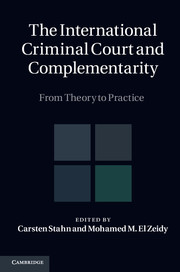Book contents
- Frontmatter
- Contents
- Acknowledgments
- Foreword by HE Judge Sang-Hyun Song
- Foreword by Patricia O’Brien
- Foreword by Silvia A. Fernandez de Gurmendi
- List of abbreviations
- Introduction: bridge over troubled waters?
- PART I General reflections
- PART II Origin and genesis of complementarity
- PART III Analytical dimensions of complementarity
- 7 Complementarity as global governance
- 8 Policy through complementarity: the atrocity trial as justice
- 9 Taking complementarity seriously
- 10 International criminal justice in the era of failed states: the ICC and the self-referral debate
- 11 The quest for constructive complementarity
- 12 Reframing positive complementarity
- 13 Too much of a good thing?: implementation and the uses of complementarity
- PART IV Interpretation and application
- PART IV (Continued) Interpretation and application
- PART V Complementarity in perspective
- PART VI Complementarity in practice
- Index
- References
7 - Complementarity as global governance
from PART III - Analytical dimensions of complementarity
Published online by Cambridge University Press: 05 November 2014
- Frontmatter
- Contents
- Acknowledgments
- Foreword by HE Judge Sang-Hyun Song
- Foreword by Patricia O’Brien
- Foreword by Silvia A. Fernandez de Gurmendi
- List of abbreviations
- Introduction: bridge over troubled waters?
- PART I General reflections
- PART II Origin and genesis of complementarity
- PART III Analytical dimensions of complementarity
- 7 Complementarity as global governance
- 8 Policy through complementarity: the atrocity trial as justice
- 9 Taking complementarity seriously
- 10 International criminal justice in the era of failed states: the ICC and the self-referral debate
- 11 The quest for constructive complementarity
- 12 Reframing positive complementarity
- 13 Too much of a good thing?: implementation and the uses of complementarity
- PART IV Interpretation and application
- PART IV (Continued) Interpretation and application
- PART V Complementarity in perspective
- PART VI Complementarity in practice
- Index
- References
Summary
The traditional understanding of the International Criminal Court's complementarity regime ‘contemplate[s] an institution that may never be employed’. In this contribution, I submit that this understanding misses important theoretical as well as practical facets of complementarity. To arrive at this conclusion, I will analyse the complementarity principle from the point of view of global governance theory. This will reveal that, unlike an ordinary court of (criminal) law, the International Criminal Court (ICC) is not only called upon to prosecute international crimes and thus target international criminals; rather, the ICC in general and the complementarity principle in particular, are part of a more comprehensive, multilevelled, polycentric and actor-open enforcement regime of international criminal law. This enforcement regime results from aggregate and complex interactions in networks of state and non-state actors across all geopolitical levels, which can be, but do not necessarily have to be ordered hierarchically. Complementarity as global governance rationalizes the all-too-often irrational division of labour, material resources, information and expertise between these centres of activity; what is more, complementarity as global governance aligns the various actors operating in and between these centres of activity towards a common goal: to end impunity by solving the various deficiencies in the polycentric and multilevelled international atrocities regime. This polycentric setting requires also that third states are taken into the complementarity equation, and that they are to cooperate (be it vertically or via international institutions or horizontally with each other) in all stages of the effectuation of international criminal justice (e.g. by way of ‘anticipated legal assistance’). In reading complementarity as global governance, I suggest rethinking the teleology of the complementarity principle, the pertinent regulatory contexts, the relevant actors and their functions and ambits in order to comprehend more fully the current and future challenges to international criminal justice.
- Type
- Chapter
- Information
- The International Criminal Court and ComplementarityFrom Theory to Practice, pp. 167 - 196Publisher: Cambridge University PressPrint publication year: 2011
References
- 1
- Cited by



